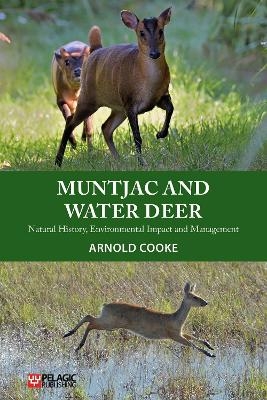
Muntjac and Water Deer
Pelagic Publishing (Verlag)
978-1-78427-190-9 (ISBN)
Muntjac and water deer were introduced to Britain from East Asia. This book provides a comprehensive overview of their natural history and the management of their environmental impacts.
In lowland England, muntjac deer are one of the drivers of changes in woodland structure and species composition, and many of the principles relating to such woodland impact are also applicable to the activities of other species of deer. Interest in environmental impacts of deer is not solely restricted to woodlands. The highest densities of water deer occur in wetlands, where there is potential for conflict, and considerable numbers are also found on agricultural land. Muntjac have also settled in suburbia and frequently cause impacts there. Conservationists and national decision makers are concerned both about invasive alien species and about increasing deer populations.
The first section covers the natural history of both species including: breeding biology, deer in the field, colonisation of Britain, a detailed look at colonisation in a single county, methods for studying deer populations and a review of deer population numbers. The second section covers environmental impact: risk assessment, impact management, control of muntjac, effect of muntjac browsing and grazing, habitat recovery from muntjac impacts and a study on the impacts of water deer. The section concludes with an overview of management and monitoring.
The costs and benefits of both species are discussed, and questions asked about whether we are getting on top of problems caused by muntjac (locally and nationally) and will water deer turn out to be similar to muntjac? Attitudes and approaches to these species are changing: with water deer we are actively studying whether it might be an environmental problem, not waiting until after it has obviously become one. What will happen to distribution, numbers, impacts and attitudes in the future? Will water deer ever become a suburban animal? What does the future hold for water deer in China and Korea - and how important is the English population as a global conservation resource?
Arnold Cooke worked for the national nature conservation agencies as a researcher and an adviser for 30 years, leaving in 1998 to pursue his interests in deer, birds and herpetofauna. In total, he has written more than 200 articles, books and reports on subjects as diverse as pollutants in birds of prey and the status of Britain’s amphibians and reptiles. In 2017, he was awarded the Balfour-Browne trophy by the British Deer Society for his work on muntjac and water deer.
Acknowledgements
Abbreviations
1. Introduction
2. Basic natural history
3. Breeding
4. Deer in the field
5. Colonisation at national level
6. Colonisation of a county
7. Methods for determining population size and changes at sites
8. Colonisation, population stability and change in uncontrolled populations
9. Interaction between deer species
10. Densities and numbers
11. Introduction to impacts
12. Processes in impact management
13. Controlling muntjac populations
14. Effects of muntjac browsing and improvements in response to management
15. Introduction to the impacts of muntjac grazing
16. Impacts on specific ground flora and recovery following management
17. Indirect effects of muntjac on animals
18. Recoveries in Monks Wood since control of muntjac began
19. Deer impacts at Woodwalton Fen
20. Overview of management
21. The present and the future
Appendices
References
Index
| Erscheinungsdatum | 14.05.2019 |
|---|---|
| Reihe/Serie | Pelagic Monographs |
| Zusatzinfo | Maps; 18 Tables, black and white; 92 Figures |
| Verlagsort | Exeter |
| Sprache | englisch |
| Maße | 156 x 234 mm |
| Gewicht | 840 g |
| Themenwelt | Sachbuch/Ratgeber ► Natur / Technik ► Naturführer |
| Naturwissenschaften ► Biologie ► Zoologie | |
| ISBN-10 | 1-78427-190-X / 178427190X |
| ISBN-13 | 978-1-78427-190-9 / 9781784271909 |
| Zustand | Neuware |
| Informationen gemäß Produktsicherheitsverordnung (GPSR) | |
| Haben Sie eine Frage zum Produkt? |
aus dem Bereich


